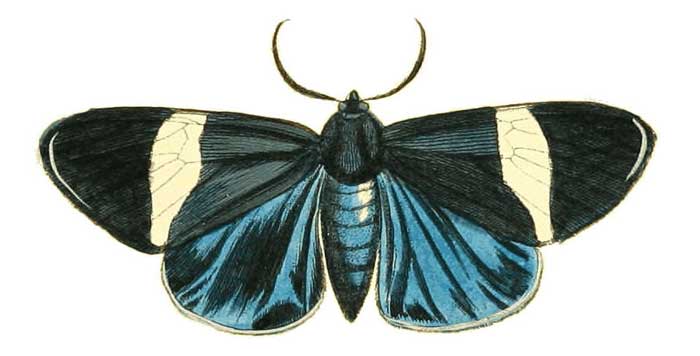
Superregnum: Eukaryota
Cladus: Unikonta
Cladus: Opisthokonta
Cladus: Holozoa
Regnum: Animalia
Subregnum: Eumetazoa
Cladus: Bilateria
Cladus: Nephrozoa
Cladus: Protostomia
Cladus: Ecdysozoa
Cladus: Panarthropoda
Phylum: Arthropoda
Subphylum: Hexapoda
Classis: Insecta
Cladus: Dicondylia
Subclassis: Pterygota
Cladus: Metapterygota
Infraclassis: Neoptera
Cladus: Eumetabola
Cladus: Endopterygota
Superordo: Panorpida
Cladus: Amphiesmenoptera
Ordo: Lepidoptera
Subordo: Glossata
Cladus: Coelolepida
Cladus: Myoglossata
Cladus: Neolepidoptera
Infraordo: Heteroneura
Cladus: Eulepidoptera
Cladus: Ditrysia
Cladus: Apoditrysia
Cladus: Obtectomera
Cladus: Macroheterocera
Superfamilia: Noctuoidea
Familia:Erebidae
Subfamilia: Arctiinae
Tribus: Arctiini
Subtribus: Pericopina
Genus: Hypocrita
Species: Hypocrita pylotis
Hypocrita pylotis is a moth of the family Erebidae. It was described by Dru Drury in 1773. It is found in Honduras.[1]
Description
Upperside: antennae black and pectinated (comb like). Tongue orange and spiral. Head, thorax, and abdomen fine mazarine blue. Anterior wings dark mazarine, having a single white bar running from the middle of the anterior edge to the lower corner. A small part of the cilia at the tips is white, the rest being of the same colour as the wings. Posterior wings of the same colour as the superior, and immaculate, except the cilia, which is entirely white.
Underside: palpi black. Neck white. Breast and sides mazarine. The legs black and white. Abdomen orange, ringed with mazarine. Wings coloured as on the upper side; but next the body of a finer and stronger blue. The white part of the tips is also stronger and more distinct. The margins of all the wings are entire. Wing-span 2+1⁄2 inches (64 mm).[2]
References
Savela, Markku. "Hypocrita pylotis (Drury, 1773)". Lepidoptera and Some Other Life Forms. Retrieved September 7, 2019.
Drury, Dru (1837). Westwood, John (ed.). Illustrations of Exotic Entomology. Vol. 2. p. 11. pl. V.
Pitkin, Brian & Jenkins, Paul. "Search results Family: Arctiidae". Butterflies and Moths of the World. Natural History Museum, London.
Retrieved from "http://en.wikipedia.org/"
All text is available under the terms of the GNU Free Documentation License

